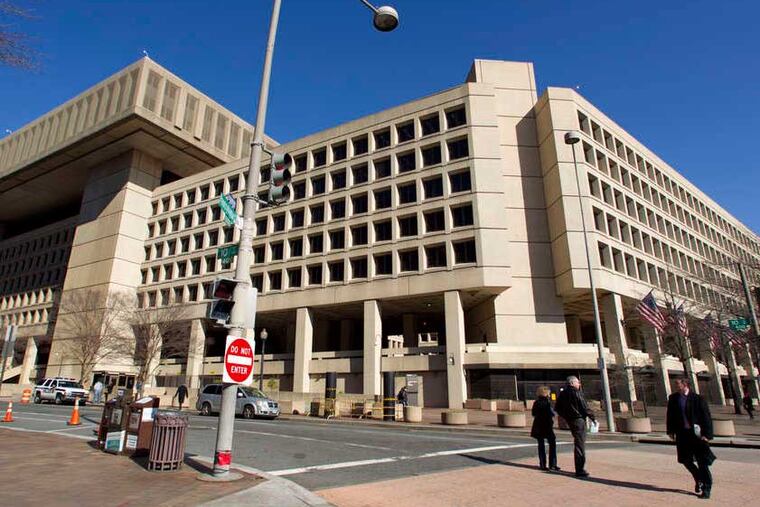Gee, man: Wanna own the FBI HQ?
WASHINGTON - Just six blocks from the White House, the FBI's hulking headquarters overlooking Pennsylvania Avenue has long been the government building everyone loves to hate. The verdict: It's an ugly, crumbling concrete behemoth, an architectural mishap - all 2.4 million square feet of it.

WASHINGTON - Just six blocks from the White House, the FBI's hulking headquarters overlooking Pennsylvania Avenue has long been the government building everyone loves to hate. The verdict: It's an ugly, crumbling concrete behemoth, an architectural mishap - all 2.4 million square feet of it.
But in this time of tight budgets, massive deficits and the "fiscal cliff," the 38-year-old FBI headquarters building has one big thing in its favor:
It sits atop very valuable real estate - an entire city block on America's Main Street, midway between the U.S. Capitol and the White House. Just how valuable? The General Services Administration intends to find out.
Last week, the agency that oversees all federal buildings issued an invitation to developers: How would you like to build a new headquarters for the FBI in a different location? In exchange, we'll consider throwing in the J. Edgar Hoover building and the underlying land as part of the transaction.
"We're testing the marketplace," the General Services Administration's acting administrator, Dan Tangherlini, said in an interview. "We think we have very valuable property. How much is it worth?" Tangherlini wants to see if it could be traded for a property that better meets current needs.
The finish line is still a long way off. But in perhaps seven years, according to an estimate last year by the Government Accountability Office, the FBI could be in a new home at a fresh location in Washington or one of its surrounding counties.
What will really happen to the J. Edgar Hoover Building? If last year's report from the GAO, Congress' investigative arm, is any indication, a developer might want to knock it down and start over.
That report displayed photographs of concrete-facing that came loose and had to be removed from the building's exterior. Another problem: Rainwater runoff infiltrated the basement. Solution: The FBI jury-rigged a plastic chute that directed the rainwater into a recycling bin.
In 1974, agents started moving into the new building from cramped quarters in the Justice Department across the street. The FBI building, which cost $126.1 million to build back then, occupies a 6.66-acre square block in the central business district.
Here's what planners have in mind.
"We envision that if and when the FBI relocates, that the site be reconsidered for mixed use as office space with retail, restaurants, cultural and residential components," said Elizabeth Miller, of the National Capital Planning Commission, an independent federal agency. That goal could be achieved by either starting over or reusing the building there now, a planning commission document says.
Miller cites the Newseum, which was built nearby along Pennsylvania Avenue, as one example of what the planning commission envisions.
Half a block down Pennsylvania Avenue, the GSA has chosen Donald Trump to spend $200 million to renovate the Old Post Office, completed in 1899, as a luxury hotel.
Mary Fitch, executive director of the Washington chapter of the American Institute of Architects, said: "Many people have put the FBI building on their lists of least-liked Washington buildings because of what they view as its harsh and overbearing design and how it deadens street life on all four sides.
"These feelings have intensified in recent years as the redevelopment and renaissance of Pennsylvania Avenue and the Penn Quarter neighborhood have made the FBI building's forbidding, defensive design less and less compatible with its surroundings," Fitch added.
The building wasn't originally intended to be quite so cold and forbidding.
City planners envisioned shops and buildings with open arcades and courtyards along a redeveloped Pennsylvania Avenue. Initially, the FBI agreed, but the bureau's final design modified that for security reasons. FBI officials explained that the first floor along Pennsylvania Avenue was closed with marble facing rather than leased to shops for fear that foreign agents might find a way to use the shops as a base to eavesdrop on the bureau. The public was blocked off from the building's center courtyard, also for security.